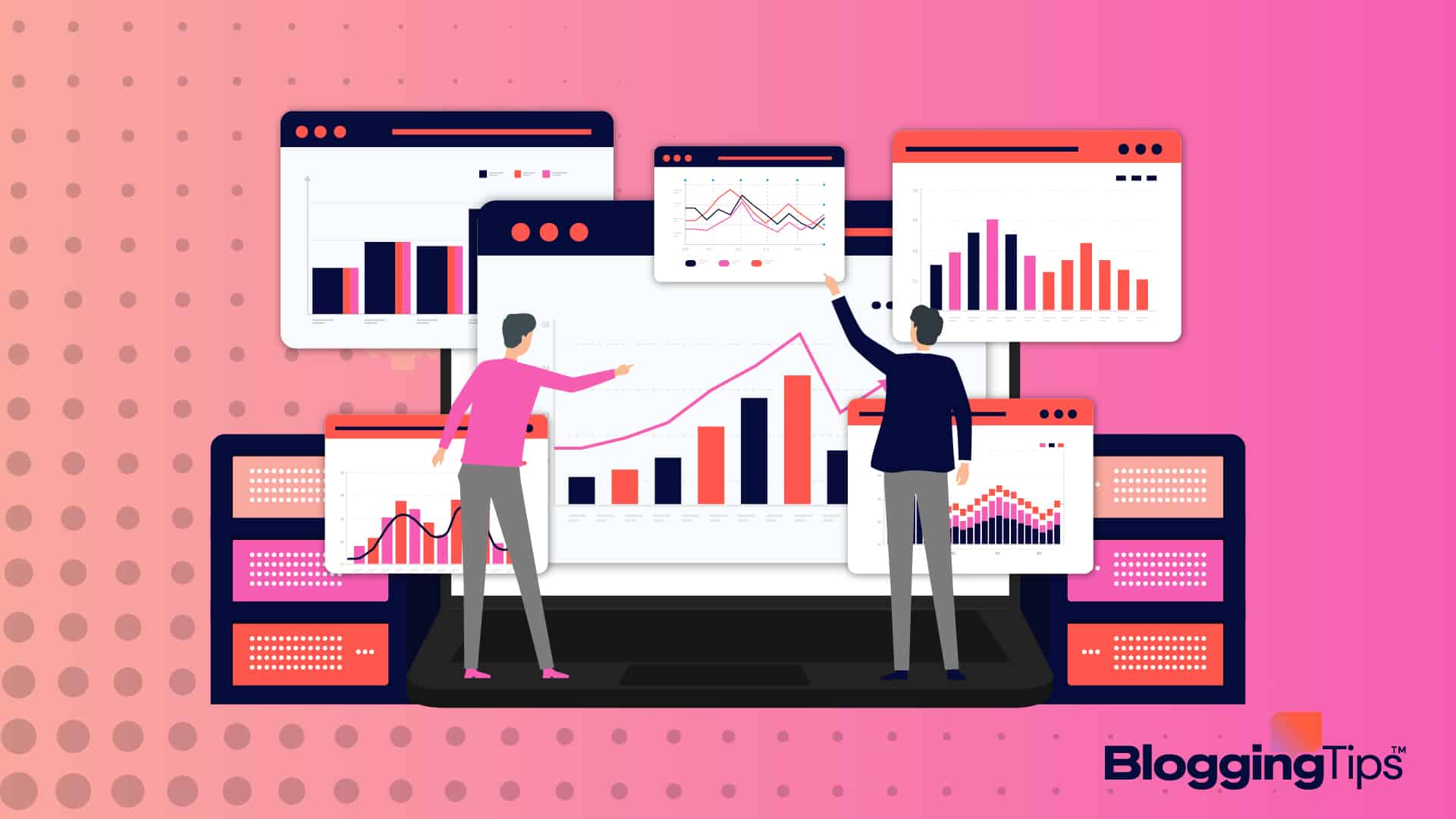Data analytics is the process of using statistical techniques and some business know-how to interpret large amounts of information to make better decisions.
As technology continues to advance, so does the amount of data that businesses collect. This is where data tools come in handy. They’re essentially a set of technologies that help simplify the process of data analytics, along with data analysis.
Big data tools, in particular, help companies leverage information by analyzing it in new ways and making it more accessible.
So, what are the best big data tools and technologies today? Why would someone even need to use big data tools? Stick around to find out.
The Best Big Data Tools (Overview)
We’ve included an overview of our top picks below. For detailed information on each pick, scroll down.
- Apache Spark
- Apache Hadoop
- Apache Flink
- MongoDB Atlas
- BigQuery
- Sisense
- RapidMiner
- Integrate.io
- Adverity
- Dataddo
- Knime
What Does Big Data Mean?
According to IBM, big data is the mass of information that organizations create and collect. It’s a combination of structured, semi-structured, and unstructured data.
Data comes from many sources, such as sales records, social media posts, and video feeds. Data can be anything from text documents like emails or spreadsheets to videos or images.
These days, there’s an overwhelming amount of data available. In fact, according to IDC, there were about 64 zettabytes of digital data in 2020 alone.
How much more in 2023? Just imagine how digital data can triple or even quadruple each year. That’s why having a big data analytics tool is crucial.
Why Someone Would Need Big Data Tools and Analytics
As more aspects of our lives become digital, we’re leaving behind huge amounts of data about ourselves, from what we buy online to where we spend our time offline.
That means businesses have more information at their fingertips than ever before. However, with the bunch of data they receive, they’ll need a big data analytics platform to process it.
That’s where big data tools come in!
Big data tools provide you with the best possible way to understand what’s happening in your business and how to make decisions accordingly.
Big data tools and analytics allow you to take a deep dive into the numbers that matter most to your company.
They help you make informed decisions on everything that’s of value to your company, from product development to marketing strategy. On top of that, you can utilize big data tools to analyze trends, predict outcomes, and plan for the future.
Powerful big data tools help turn information into knowledge that you can use to better serve your customers and grow your sales.
The Best Big Data Tools in 2023
If you’re gearing up to get big data tools for your company this year, refer to the list below for the best ones:
1. Apache Spark
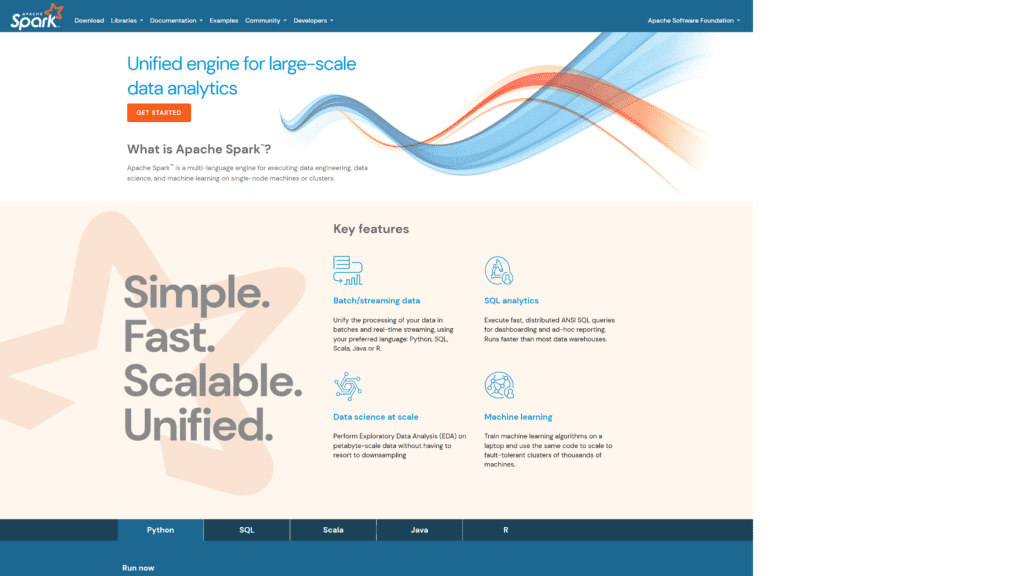
Price: Free
Apache Spark is a multi-language data analytics engine that’s utilized in data science, data engineering, and machine learning on single-node clusters or machines.
It’s, by far, one of the most used big data tools because it’s an open-source framework and free. It’s popular among those who frequently do data analytics or big data analysis.
Here are its key features:
- Batch/Streaming Data. It can put all your data generated into one batch and real-time processing stream. It uses the languages SQL, Python, Scala, R, or Java.
- SQL Analytics. It executes distributed ANSI SQL queries fast enough for ad-hoc reporting and dashboarding. Also, it runs faster compared to other data warehouses.
- Machine Learning. Using your laptop, you can train machine algorithms and just use the same code to scale various machines’ fault-tolerant clusters from data stores.
- Data Science at Scale. Even without using downsampling, it can perform Exploratory Data Analysis (EDA) on any data on a petabyte scale.
2. Apache Hadoop
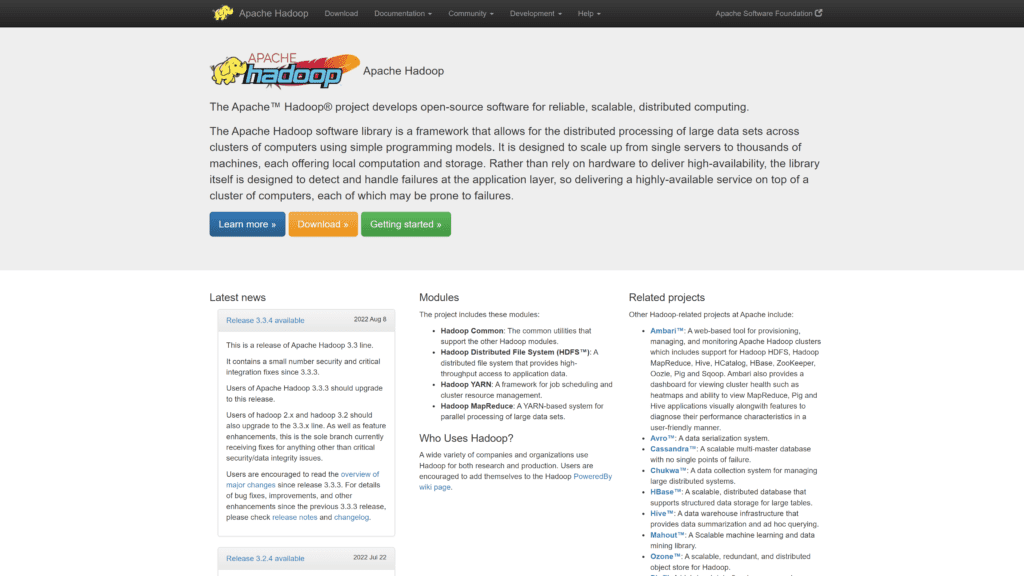
Price: Free
Just like with Spark, Apache Hadoop has an open-source framework for reliable and scalable distributed computing, making it one of the best big data tools out there.
With the use of simple programming models, it features a framework that can do distributed data processing of big data batches among various clusters of computers.
Its key features are its modules, which are as follows:
- Hadoop Common. It’s a bunch of common utilities that support other modules here.
- Hadoop Distributed File System (HDFS™). As a distributed file system, it can provide high-throughput access to any application data.
- Hadoop Yarn. It’s a framework for scheduling jobs and other tasks that involve managing cluster resources.
- Hadoop MapReduce. It’s a YARN-based system that’s capable of processing big data sets in parallel.
3. Apache Flink
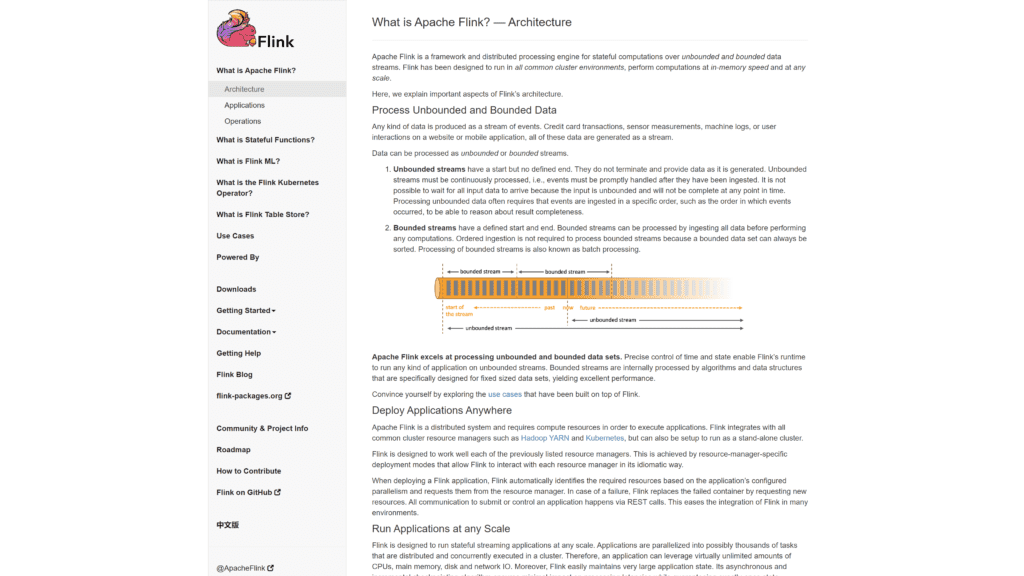
Price: Free
Apache Flink is a framework and distributed-event processing engine that deals with bounded and unbounded data streams.
It’s specially designed to perform different kinds of data computations at in-memory speed and any scale and run all common cluster environments.
Here are its key features:
- All Streaming Use Cases. It’s perfect for different event-driven applications.
- Guaranteed Correctness. It has state consistency, precise event-time processing, and sophisticated late-data handling.
- Layered APIs. It has three-layered APIs: SQL/Table API, DataStream API, and Process Function.
- Operational Focus. It has a flexible deployment and a high-availability setup, and it runs your applications 24/7.
- Scales to Any Use Case. It supports large states, scale-out architecture, and incremental checkpointing.
4. MongoDB Atlas
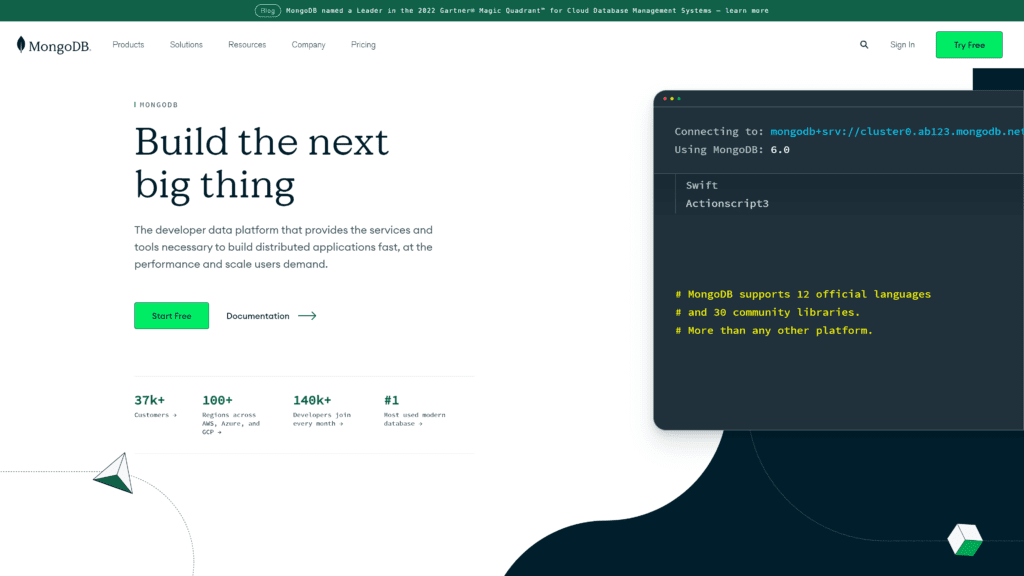
Price: $0.10 – $57.00 per month
MongoDB Atlas is a multi-cloud database service for big and raw data. It’s basically made by the same team who made MongoDB, which is known for its NoSQL database.
What makes it different from the latter is that it simplifies managing your databases. With it, you can deploy databases wherever you are and whenever you want to.
Here are its key features:
- JSON-like Document Model. You can develop faster with its model that maps objects in any of your application codes.
- Unified Query API. You may work with any kind of data you wish. It has a NoSQL database.
- Secure Scalable Workloads. It has built-in data security that’s hard to breach. It even has recovery defaults.
5. BigQuery
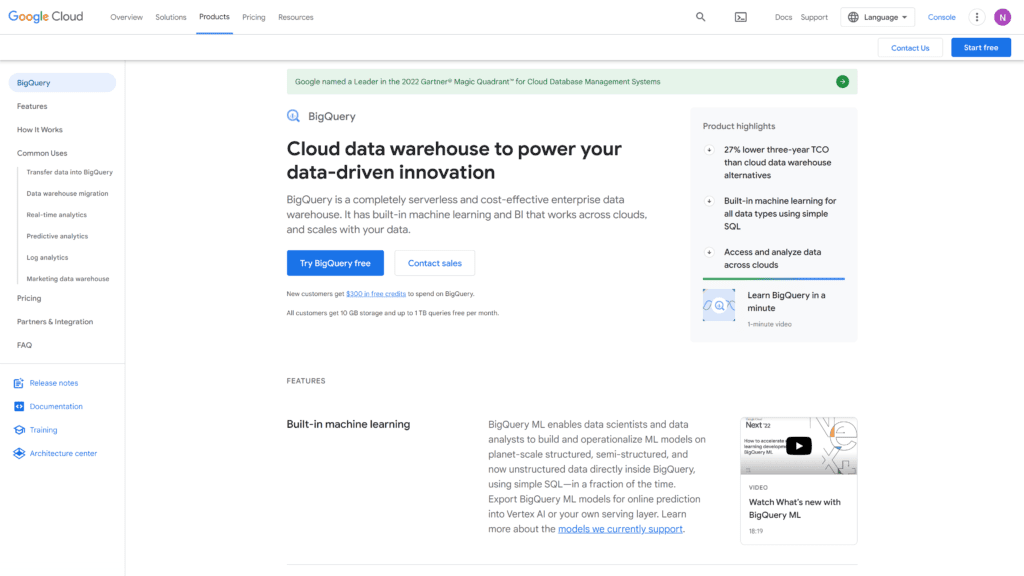
Pricing: $5 – $2,000 per month
It’s no secret that Google Cloud Platform is one of the biggest, if not the biggest, cloud platforms and big data tools out there. It has 20+ products, which are all well-established.
One of the best products it offers is BigQuery. It’s completely serverless, which means you can execute it wherever there’s an internet connection since it’s cloud-based.
Its machine learning and BIs work across the internet. They’re all scalable to your data and have excellent data mining.
Here are its key features:
- Built-In Machine Learning. Data scientists can do big data analytics on ML models on planet-scale structured, semi-structured, and unstructured data.
- Analyze and Share Data. You can share and analyze data on the cloud, so it’s convenient for those who have team members all over the globe.
- Data Analytics in Real-Time. It can handle streaming data and make it available straight to query.
- Data Management. You can query all types of data, from structured to unstructured.
6. Sisense

Price: On request
With Sisense, you can get real-time processing of insights into your business and make decisions that matter. You can do this by easily connecting to the databases where your business stores its data and applying powerful analytics to it.
It has a simple drag-and-drop interface that makes it easy for anyone to connect to the database, start exploring data, and create visualizations.
You can even collaborate with other team members by sharing dashboards or entire projects.
It has results that are stunning: beautiful visualizations that give you a clear picture of what’s happening in your company and how to improve it!
Here are its key features:
- Highly Customizable. You can personalize your own data. They have customizable APIs that do data visualization, unlike any other big data tool.
- AI-Driven. It has an AI-powered algorithm that suggests what’s the next move based on your data analytics tasks.
- Scale On-Demand. With the cloud, you can utilize this big data tool anywhere in the world as long as there’s an internet connection.
7. RapidMiner
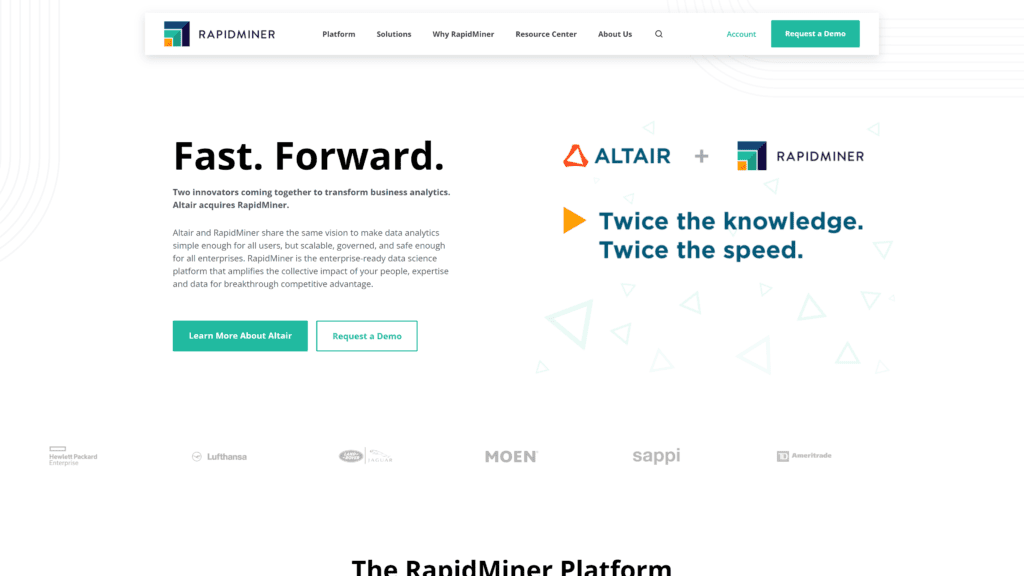
Price: On request
RapidMiner makes data analytics simple. Powerful yet easy to use, RapidMiner empowers everyone in your company to make more informed decisions faster.
You can easily dive into data, explore your information, and easily build predictive analytics models for predictive maintenance of your equipment, customer recommendations, or scoring new business opportunities.
Here are its key features:
- Accelerates Enterprise Adoption. It makes data science non-intimidating with its well-structured adoption procedure.
- Contextualizing Data. It’s perfect for precise and user-friendly data visualization. It gives life to your data.
- Reliable Big Data Tool. With the abundance of digital data, it needs a reliable big data software to handle it more conveniently than before.
8. Integrate.io
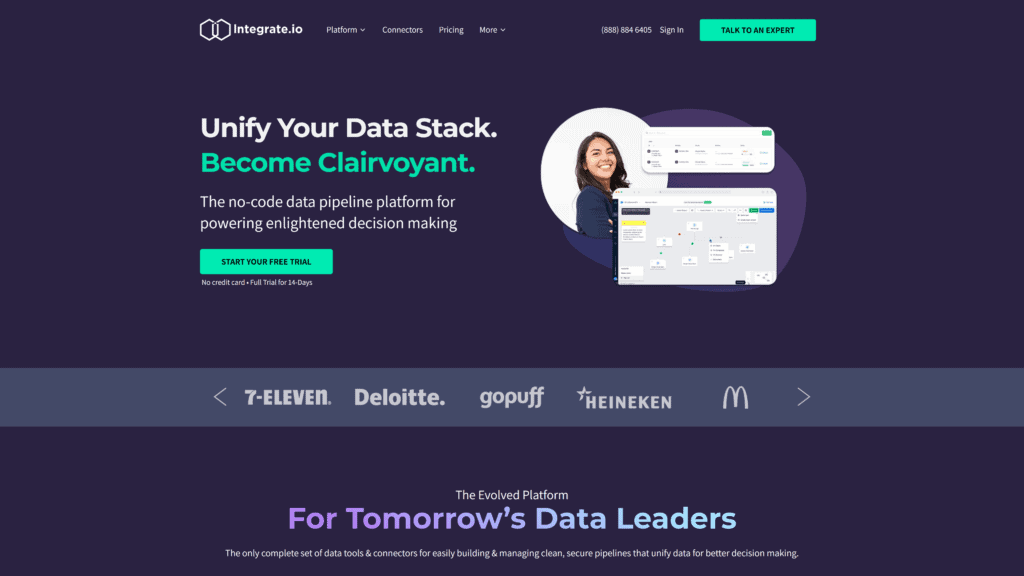
Pricing: $15,000 – $25,000 per year
With integrate.io, you can create an API for any service or data source in minutes—no coding is required.
You can then use this API to build integrations with your existing tools and applications, giving you a single point of access for all of your data sources.
You can also use the platform’s built-in visual editor to build custom connectors that allow you to connect with virtually any database or application in existence.
Once they’re built, these connectors are managed via its dashboard and can be deployed across whole teams with just one click.
Here are its key features:
- No Code ETL & Reverse ETL. You can easily drag and drop no-code data pipelines.
- Easy ELT & CDC. Make a single source for all of your data analytics and reporting.
- Automated API Generation. It has one of the fastest APIs in the market today.
- Data Observability. You can monitor your data 24/7 at whichever angle.
9. Adverity
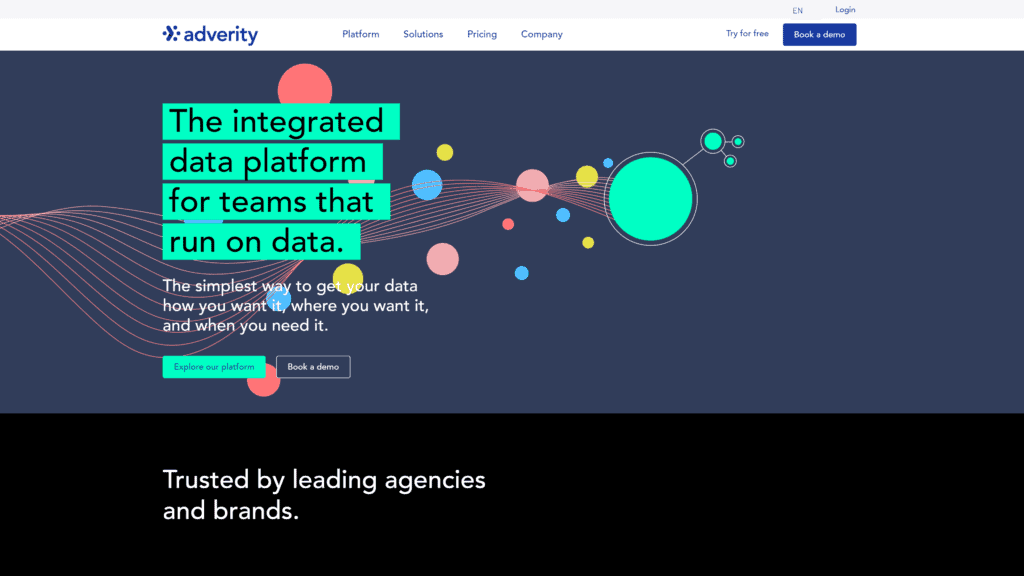
Pricing: On request
Adverity is one of the big data technologies that help you make sense of the mountains of data that you’re collecting. With it, you can quickly and easily identify trends in your data, allowing you to make informed decisions.
You can track every aspect of your company’s performance—from sales and marketing to customer experience, customer service, and more. You can also track operational metrics, like inventory levels.
Here are its key features:
- Save Time and Money. You can save much of your time handling your data with its AI solution that gives insights faster than before.
- Improve Performance. Coalesce a bunch of raw data into one meaningful data visualization that can help you make informed decisions.
- Data Management. You have all the reins on how to use your data.
10. Dataddo
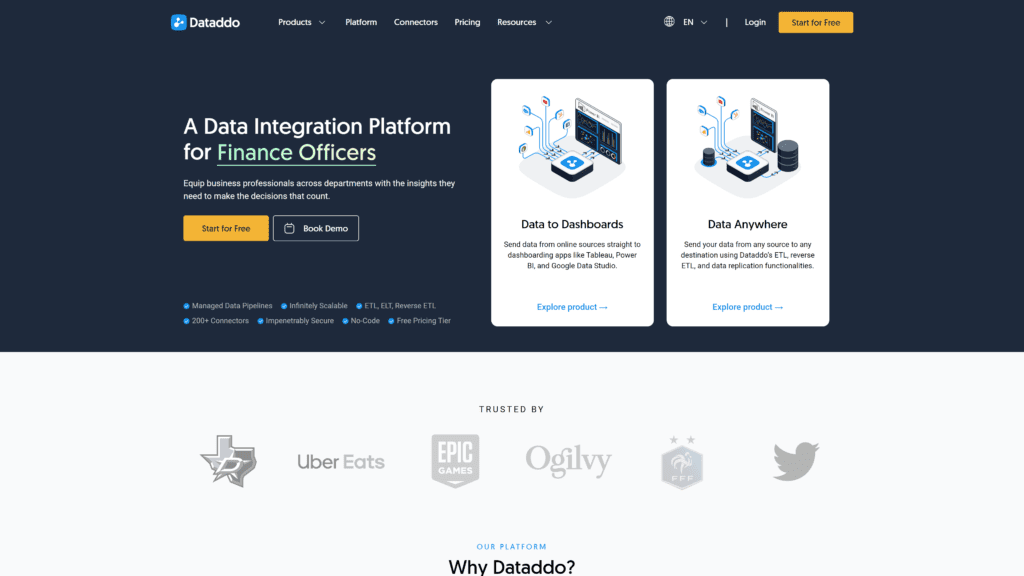
Pricing: $0 (free) – $99 per month
Dataddo allows you to create powerful visualizations, explore your data, and discover insights.
With it, you can create beautiful visualizations with just a few clicks. You can also drag and drop your data into the visualization builder and watch your data come to life.
If you want more control over how your data looks, Dataddo’s visualization builder lets you make custom charts from scratch—no coding required!
Here are its key features:
- Friendly User Interface. Whatever technical experience you have regarding data science, you’ll get the knack for using this platform in no time.
- No Maintenance. Unlike others, you don’t have to worry about pipeline maintenance or API changes.
- Highly Secured. It has a SOC 2 Type II certification, and it’s compliant with all the data privacy laws. It strictly adheres to ISO 27001. It has data cleansing for security purposes.
11. Knime
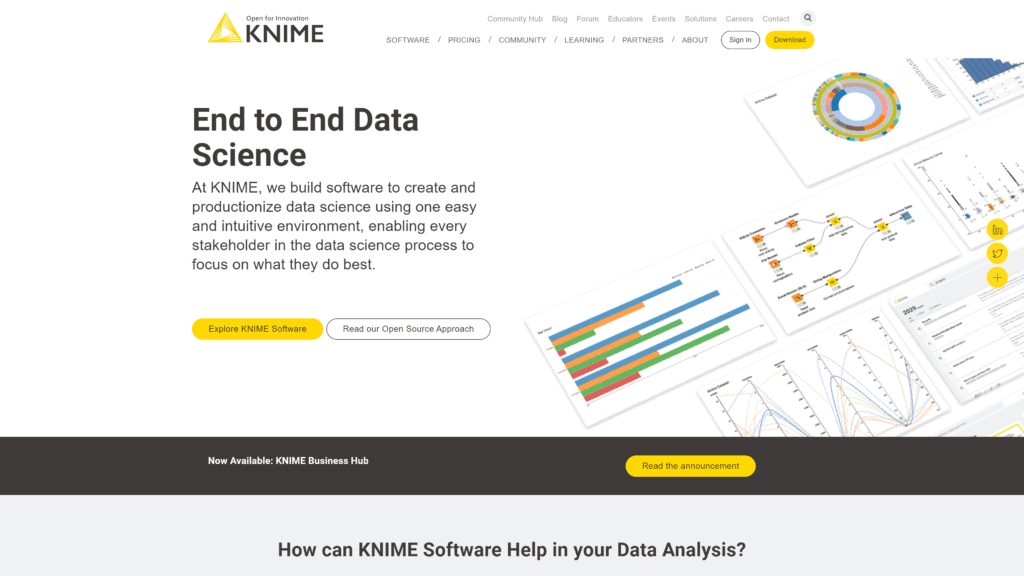
Pricing: On request
Knime is a data-processing platform that’s one of the best big data analytics tools. You can create an end-to-end data integration process that includes multiple data values or data sets. It can do batch processing with ease.
It also allows users to explore, analyze, and visualize data; in fact, it can retrieve information from a data warehouse or data storage fast. It’s also a good data visualization tool.
Here are its key features:
- Access Data Sets. You can access, merge, or transform your data from a data warehouse easily.
- Batch Processing. Processing big data is one of its perks, and it can do parallel processing as well.
- Visualize Any Data Models. It’ll create a meaningful visualization out of the multiple data sources you have with its different training data models.
Choosing the Right Big Data Tool
The key to choosing the right tools is understanding what you need them for, how they work together, and how they integrate with other systems in your organization.
You also need to consider how much money you’re willing to spend on these tools, as well as how much time it will take for your team to learn how to use them.
Big data has transformed many industries, but it’s still in its early days for most businesses in terms of using these tools effectively.
As more companies find ways to make better use of their data, however, it’s becoming clear that those who fail to adapt will find themselves left behind by their competitors.
When choosing a big data tool, there are a few things you should keep in mind:
- The tool should be scalable. If you’re only just beginning your journey into big data, it’s not necessary to choose a tool that can scale to match Google, Amazon, or Facebook. However, it should be able to grow with your needs as you become more experienced with the data you’re collecting and analyzing.
- The tool should be user-friendly. Big data analytics tools should be flexible and easy to use but still powerful enough for the job at hand. Big data tools can be very complicated, even if they’re designed for beginners.
- The tool can integrate with other platforms. This makes it easier to keep everyone on the same page when it comes time for big data analytics or reporting on results from different sources.
Benefits of Using Big Data Tools
- They help you to make better business decisions by providing access to information fast and accurately.
- They allow you to collect data and conduct data analysis about your customers, which allows you to develop products and services that meet their needs better than ever before.
- You can also use these tools for internal purposes, such as tracking employee performance and helping them learn new skills.
- They help improve productivity levels within departments across your entire organization.
Frequently Asked Questions
Is SQL a Big Data Tool?
No, it’s not. It’s a domain-specific language, one of many programming languages.
IBM developed SQL in the 1970s to have data access in relational databases. It has grown beyond just relational database systems, though.
With the growing demand for data science, data integration, etc., there are big data tools in the market today that utilize SQL to cater to traditional databases.
Also, SQL can work better on a low volume of data. Remember, with the timeline of data processing, the low volume of data today was once considered big before.
Is Python a Big Data Tool?
No. It’s a general-purpose programming language that can be used for anything from small tasks to large projects.
It’s one of the most popular languages in use today because it’s powerful and flexible. The syntax allows developers to write code quickly and easily.
It’s also open-source, which means anyone can use it without paying licensing fees or royalties.
Wrapping Up
Choosing the right big data tools is an important part of your business’s success. The right tool will enable you to make data-based decisions that will aid in the growth of your business.
We’re certain that one of the above-listed big data tools will meet your needs!
